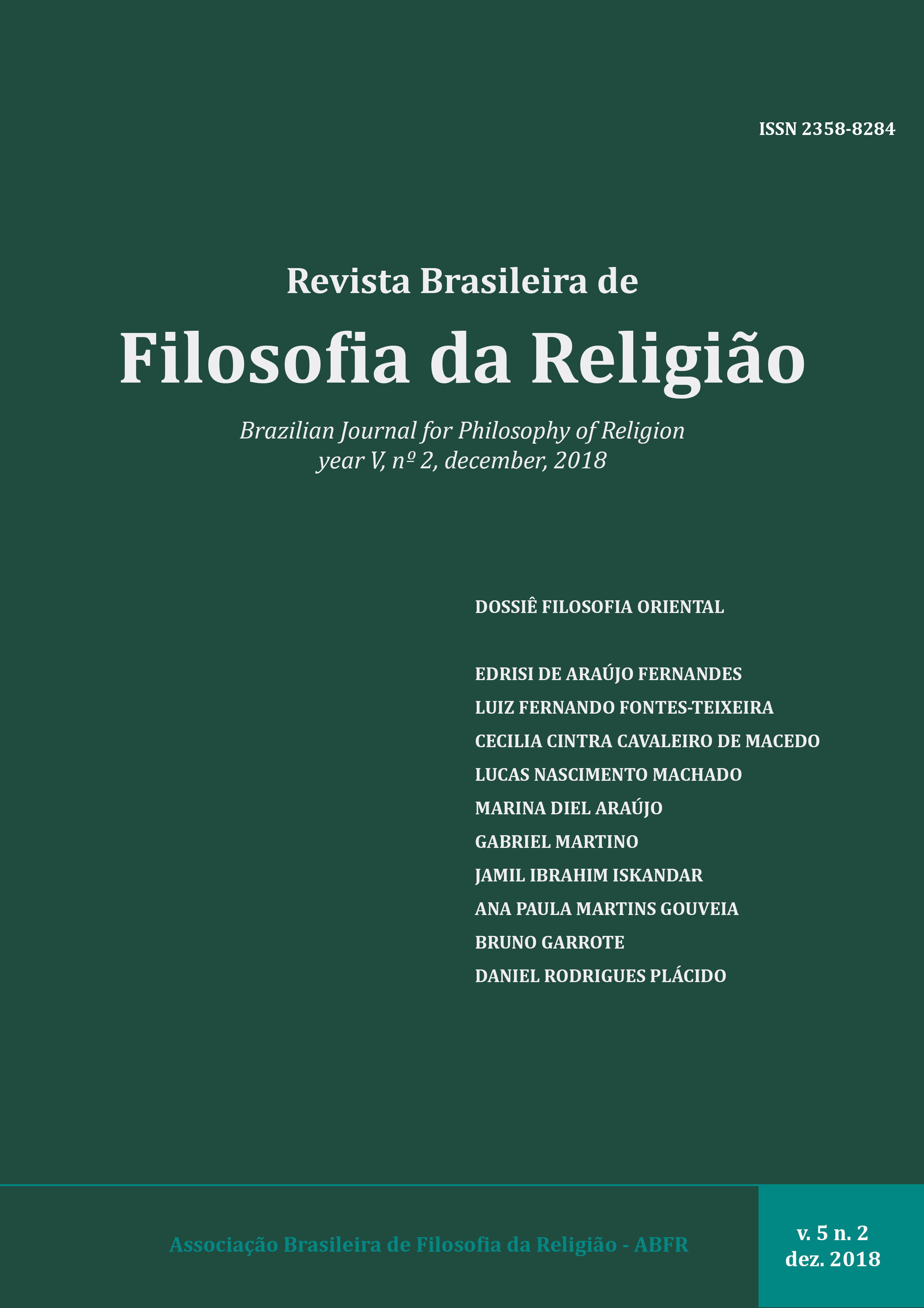On the On The Ways of Relating to rhe Other: Some Remarks on the Issue About the Existence of Eastern and Non-European Philosophies
DOI:
https://doi.org/10.26512/2358-82842018e26331Keywords:
Eastern philosophies, non-European philosophies, comparative philosophy, intercultural philosophy, Other.Abstract
Abstract: In this paper, we aim to briefly approach the issue on the existence of Eastern and non-European philosophies through the philosophical problem of the Other. As a matter of fact, in the discussion on the possibility of speaking of Eastern and non-European philosophies, fundamental philosophical presuppositions are often introduced regarding the possibilities and limits of understanding and approaching other cultures, presuppositions which depend, to a large extend, on the conceptions that one has of what the Other is and of what means are available to relate to him. It seems thus that the discussion on the existence of Eastern and non-European philosophies brings us to the discussion of a central philosophical question: how should we understand the Other? Through the discussion of this and other philosophical questions, we believe is possible to offer a philosophical and argumentative basis to defend the possibility of speaking of Eastern and non-European philosophies, without being led either to the extreme of the mystification of the Other or to the absolute identification and transposition of our categories to him.
Key-words: Eastern philosophies, non-european philosophies, comparative philosophy, intercultural philosophy, Other.
Downloads
References
BRONKHORST, J (1999). “Why is there philosophy in India?”, Palestra feita em Amsterdam:
Royal Netherlands Academy of Arts and Sciences. Disponível na internet em
https://www.academia.edu/3279201/Why_is_there_philosophy_in_India. Acessado em 13 de
março de 2016.
FLORENTINO, A (2015). “A recepção do pensamento chinês na filosofia moderna”, O que nos
faz pensar, 36: 329-341.
FLORENTINO, A. e GIACOIA, O. (orgs.) (2012). Heidegger e o Pensamento Oriental.
Uberlândia: EDUFU.
GANERI, J (2015). “Blueprint: An Institute for Cosmopolitan Philosophy in a Culturally
Polycentric World”, Perfil de J. Ganeri no Academia.Edu. Disponível na internet em:
https://www.academia.edu/8434737/Blueprint_An_Institute_for_Cosmopolitan_Philosophy_in_
a_Culturally_Polycentric_World. Acessado em 13 de março de 2016.
HADOT, P (2014). Exercícios espirituais e filosofia antiga. Tradução: Flavio Fontenelle Loque
e Loraine Oliveira. São Paulo: Edições Loyola.
HADOT, P (1998). La Philosophie Antique: une Éthique ou une Pratique. In: Études de
Philosophie Ancienne. Paris: Les Belles Lettres.
HADOT, P (2004). O que é a filosofia antiga? Tradução: Dion Davi Macedo. São Paulo: Edições
Loyola.
HEIDEGGER, M (1996). Que é isto ”“ A Filosofia? Tradução e notas: Ernildo Stein. In: Os
Pensadores. São Paulo: Editora Abril.
KING, R (1999). Indian Philosophy: An Introduction to Hindu and Buddhist Thought. Edinburgh:
Edinburgh University Press.
KOPF, G (2017). “Pensando como um budista: apropriações pela Escola de Kyoto do nãodualismo budista” (Trad. Lucas Nascimento Machado), in A Escola de Kyoto e as Suas Fontes
Orientais (Org. Antonio Florentino Neto e Oswaldo Giacoia). Campinas: Editora Phi: 23-43.
LAÊRTIOS, Diôgenes (2008). Vidas e Doutrinas dos Filósofos Ilustres. Tradução: Mário da
Gama Kury. Brasília: Editora Universidade de Brasília.
LEBRUN, G (1975). “Por que filósofo?”, Biblioteca Virtual do CEBRAP. Disponível na internet
em: http://www.cebrap.org.br/v2/files/upload/biblioteca_virtual/por_que_filosofo.pdf. Acessado
em: 13 de março de 2016.
MALL, R (2006). Philosophie im Vergleich der Kulturen. Darmstadt: Wissenschaftliche
Buchgesellschaft.
MALL, R. e PEIKERT, D (2017). Philosophie als Therapie: eine interkulturelle Perspektive.
München: Verlag Karl Aber.
MARTINS, R.A (1983). “A crítica de Hegel à filosofia da Ãndia”, Textos SEAF. 5: 58-116, 1983.
NICHOLSON, A (2016). “Orientalismo, Interpretação, e o Estudo da Filosofia Indiana no
Ocidente”, Revista Científica Guillermo de Ockham. 14(1): 125-132.
NICHOLSON, A (2014). Unifying Hinduism: Philosophy and Identity in Indian Intelectual
History. New York: Columbia University Press.
SACRINI, M (2013). “Sobre o estudo da filosofia indiana”, Discurso. 43: 229-251.
SAID, E (2007). Orientalismo: O Oriente como invenção do Ocidente. Tradução: Rosaura
Eichenberg. São Paulo: Companhia das Letras.
SCHWITZGEBEL, E (2015). “What’s missing in college philosophy classes? Chinese
philosophers”, Los Angeles Times. Disponível na internet em
http://www.latimes.com/opinion/op-ed/la-oe-0913-schwitzgebel-chinese-philosophy-20150913-
story.html. Acessado em 13 de Março de 2016.
SMITH, J. H. E (2009). “What is ‘Non-Western’ Philosophy? Part One”, Justin Erik Halldór
Smith. Disponível na internet em http://www.jehsmith.com/1/2009/12/what-is-non.html.
Acessado em 13 de março de 2016.
VIVEIROS DE CASTRO, E (2015). “Eduardo Viveiros de Castro: 'O que se vê no Brasil hoje é
uma ofensiva feroz contra os índios'”, O Globo. Disponível na internet em
http://oglobo.globo.com/cultura/livros/eduardo-viveiros-de-castro-que-se-ve-no-brasil-hojeuma-ofensiva-feroz-contra-os-indios-17261624. Acessado em 13 de março de 2016.
VIVEIROS DE CASTRO, E (2015). Metafísicas Canibais. São Paulo: Cosac Naify.

